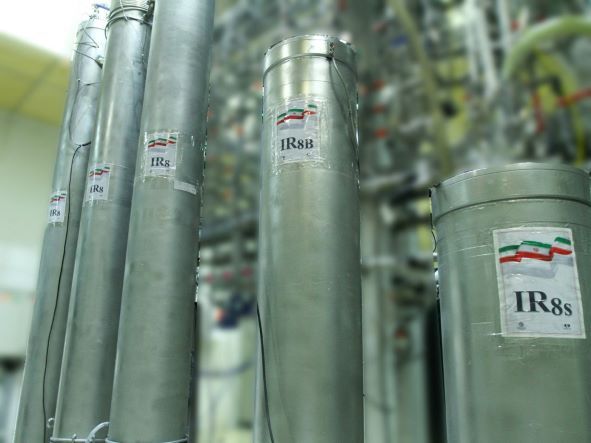- Home
- Middle East
- Western Countries Submit New Iran Resolution at IAEA

The Iranian national flag is displayed outside the International Atomic Energy Agency (IAEA) headquarters during the agency's Board of Governors meeting in Vienna on March 1, 2021. ©JOE KLAMAR / AFP
Western countries on Wednesday formally submitted a new resolution critical of Iran at the International Atomic Energy Agency (IAEA) ahead of its board meeting, diplomatic sources said.
"The text was formally submitted" just before midnight on Tuesday, a diplomatic source told AFP on condition of anonymity, with a second diplomatic source confirming the information.
Earlier Iran's foreign minister warned against submitting the new resolution. Araghchi during a conversation with his French counterpart Jean-Noel Barrot, "strongly condemned the decision of the three countries of Germany, France and the United Kingdom" in tabling the draft, warning it "will only complicate the matter further," according to a statement by the ministry on Wednesday.
Araghchi then warned on Wednesday of a "proportionate" response from Tehran after the Western-backed resolution was submitted.
He said in a phone conversation with IAEA chief Rafel Grossi that if the parties "ignore Iran's goodwill and interactive approach and put non-constructive measures on the agenda in the Board of Governors meeting through the issuance of a resolution, Iran will respond in a proportionate and appropriate manner."
European powers and the United States are moving ahead with a plan to censure Iran for its poor cooperation with the UN nuclear watchdog at this week's board meeting, despite an offer by Tehran to cap its highly enriched uranium stock, diplomats told AFP.
Tensions between Iran and Western powers have repeatedly flared since a 2015 deal curbing Tehran's nuclear programme in exchange for sanction relief fell apart.
In recent years, Tehran has decreased its cooperation with the IAEA by ramping up its nuclear activities, deactivating surveillance devices to monitor the nuclear programme and barring UN inspectors.
A plan by Britain, France, Germany and the United States to submit a new resolution against Iran comes as concerns over the rapid expansion of its nuclear programme heightened fears that Tehran might be seeking to develop a nuclear weapon.
According to the IAEA, Tehran is the only non-nuclear weapon state to enrich uranium to 60 percent, a short step from the 90 percent level needed for atomic weapons.
Iran has always denied seeking a nuclear weapon.
But a confidential IAEA report seen by AFP on Tuesday showed that Iran has further increased its stock of highly enriched uranium in recent months.
Iran's total stockpile of enriched uranium also grew to an estimated 6,604.4 kilogrammes as of October 26.
However, Iran pledged to halt the expansion of its highly enriched uranium stock during recent talks with the agency, and has since implemented preparatory steps to achieve that, the report said.
Following the report, a senior diplomat told AFP that Western powers would still go ahead with the resolution they plan to submit late on Tuesday, voicing "scepticism" about Iran's "pretty disingenuous" last-minute offer to cap its stockpile.
Another senior diplomat said "based on past experience" the recent offer by Iran will probably "not stand" anymore once a resolution is tabled.
'Too little too late'
With the planned censure, diplomats aim to raise diplomatic pressure on Iran to come back into compliance and address the IAEA's long-standing concerns.
A similar resolution was passed by the agency board in June.
According to a confidential draft of the censure seen by AFP, Western powers this time ask for a "comprehensive report" to be issued by IAEA head.
The report would seek to shed more light on Iran's nuclear activities, including "a full account" of Tehran's cooperation with the agency on uranium traces found at undeclared sites.
The planned resolution follows a trip by Grossi to Tehran last week for talks with President Masoud Pezeshkian and other high-ranking officials in a bid to improve cooperation.
However, "Grossi's visit to Tehran was... too little and too late to stave off a censure from the board", Kelsey Davenport, an expert with the Arms Control Association, told AFP.
His visit was "a missed opportunity for Pezeshkian to demonstrate that he is serious about de-escalation", she said.
"Taking tangible steps to enhance IAEA oversight of Iran's nuclear programme and address the agency's questions about past undeclared nuclear activities would have quelled speculation that Iran is engaged in illicit nuclear activities," Davenport said.
Trump's return
Earlier this month, Iran expressed hope that talks on its nuclear programme would be conducted "away from political pressure and considerations", but warned it would retaliate if a resolution is adopted.
Grossi's visit was seen as one of the last chances for diplomacy before Donald Trump returns as US president in January.
During his first term between 2017 and 2021, Trump imposed a "maximum pressure" policy against Iran.
This included Washington tearing up a deal on Iran's nuclear programme that had been reached under his predecessor, Barack Obama in 2015.
The landmark deal struck with the United States, China, Russia, France, Germany and Britain provided Iran sanctions relief in exchange for curbs on its atomic programme.
Efforts to revive the deal have so far failed.
Anne Beade, with AFP
Read more



Comments